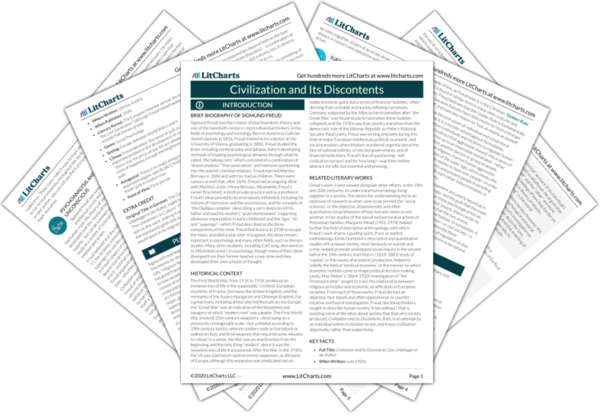Freud acknowledges that the death drive is one of the most difficult aspects of psychoanalytic theory to understand. Humans naturally feel that they want to continue to live, and to feel pleasure (Eros). The death drive, then, is an urge in human beings to destroy an object outside the self. The death drive is manifest, therefore, in what might be termed the “love-hate” relationship. Freud claims that these relationships are actually quite common—that humans frequently wish to destroy, to overpower, and to master another.
Freud believes that the death drive manifests itself both in individual and in social terms. In the individual, the death drive forms part of the regulatory mechanism of the super-ego, which seeks to master the ego, the self, especially those parts of the self that seek to love, or to have sex with, another person. Thus the super-ego causes the individual a great deal of suffering—making the love-relationship a complex one, since it is connected with pain and the prospect of more pain, should the love not last.
Within a society, the death drive causes social groups to assert dominance, and aggression, over and against other social groups, especially those that are geographically nearby. Geographic nearness is often a reflection of cultural or social nearness, in Freud’s system—this is something he calls the “narcissism of small differences.” In other words, societies, too, have super-egos, and when they see another society close to “themselves,” they wish, like the individual super-ego, to control and master that other group.
Freud essentially concludes his essay by arguing that societies use the death drive, on the individual and the group level, to create guilt, which then manages people’s actions—“keeps them in line”—controls them. Freud offers up the possibility, too, that because societies have egos and superegos, just like individuals, then societies might also be able to become psychologically “sick,” or “neurotic,” like some individuals—that their egos and superegos might be out of balance. Freud merely poses this as a mode for further inquiry—he does not answer his own provocative question in this essay.
Suffering, Aggression, and Death ThemeTracker

Suffering, Aggression, and Death Quotes in Civilization and Its Discontents
Another procedure [to avoid pain] operates more energetically and thoroughly. It regards reality as the sole enemy and as the source of all suffering, with which it is impossible to live, so that one must break off all relations with it if one is to be in any way happy. The hermit turns his back on the world . . .
Civilization . . . describes the whole sum of the achievements and the regulations which distinguish our lives from those of our animal ancestors and which serve . . . to protect men against nature and to adjust their mutual relations.
We recognize as cultural all activities and resources which are useful to men for making the earth serviceable to them, for protecting them against the violence of the forces of nature . . .
Not merely is this stranger in general unworthy of my love; I must honestly confess that he has more claim to my hostility and even my hatred. He seems not have the least trace of love for me and shows me not the slightest consideration.
The existence of the inclination to aggression, which we can detect in ourselves and justly assume to be present in others, is the factor which disturbs our relations with our neighbor and which forces civilization into such a high expenditure of energy.
Neurosis was regarded as the outcome of a struggle between the interest of self-preservation and the demands of the libido, a struggle in which the ego had been victorious but at the price of severe sufferings and renunciations.
. . . besides the instinct to preserve living substance and to join it into ever larger units, there must exist another, contrary instinct seeking to dissolve those units and to bring them back to their primeval, inorganic state.
The tension between the harsh superego and the ego that is subjected to it, is called by us the sense of guilt; it expresses itself as a need for punishment.
A threatened external unhappiness—loss of love and punishment on the part of the external authority—has been exchanged for a permanent internal unhappiness, for the tension of the sense of guilt.
. . . the price we pay for our advance in civilization is a loss of happiness through the heightening of the sense of guilt.
If the development of civilization has such a far-reaching similarity to the development of the individual . . . may we not be justified in reaching the diagnosis that, under the influence of cultural urges, some civilizations, or some epochs of civilization—possibly the whole of mankind—have become neurotic?
And now it is to be expected that the other of the two “Heavenly Powers,” eternal Eros, will make an effort to assert himself in the struggle with his equally immortal adversary [Thanatos]. But who can see with what success and with what result?
















